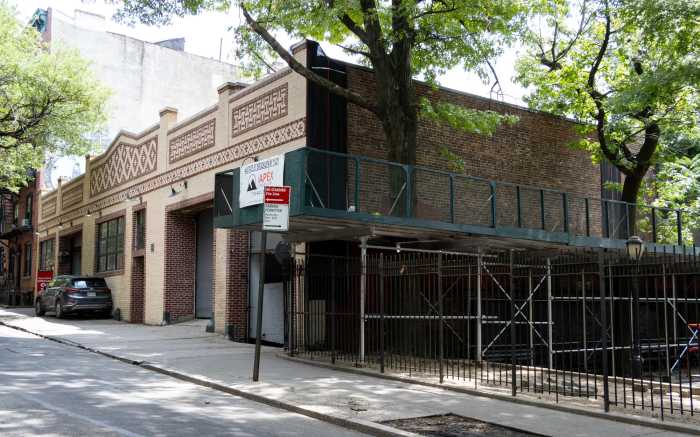Responding to calls by elected officials and activists that the Metropolitan
Transportation Authority open up the sale of development rights over rail
yards at Atlantic and Flatbush avenues to competitive bidding, as the
agency has done with the Hudson Yards in Manhattan, an agency spokesman
reiterated what he told The Brooklyn Papers last month — they already
are.
The spokesman, Tom Kelly, told The Brooklyn Papers this week that developers
other than Bruce Ratner — who proposes to build a basketball arena
over the rail yards that would be part of an overall plan including 17
high-rise office and residential buildings — are free to submit proposals
for the development rights over the Long Island Rail Road storage yards.
Kelly said the same thing in a Feb. 12 Brooklyn Papers report.
The announcement first came following comments by MTA Chairman Peter Kalikow
at a state Assembly hearing Feb. 3, where he told Westchester Assemblyman
Richard Brodsky that all developments related to Ratner’s proposed
Atlantic Yards arena plan were on hold until the bidding war over the
West Side rail yards in Manhattan was worked out.
“There are very serious considerations,” said Councilwoman Letitia
James, whose Prospect Heights district includes the Atlantic Yards proposal
where Ratner plans to bring the New Jersey Nets, which he purchased last
summer, to play in a 19,000-seat arena. “As soon as the bidding is
open for competition there will be serious bids submitted,” she said.
“There will be alternate bids submitted.”
Thus far, no other developer has come to the MTA with a proposal for the
rail yards
Kelly said that unlike the West Side battle, there is no timeline or pending
deadline for the site, therefore no request for proposals (RFP) must be
issued.
“Because there is no competition at this point,” said Tom Kelly,
a spokesman for the MTA, “there is no need for a deadline as was
the case with the West Side Yards,” he said, referring to the Manhattan
site where the Jets and Mayor Michael Bloomberg want to build a football
stadium that would also be the centerpiece of the NYC2012 Olympic bid.
In recent weeks Cablevision, which owns Madison Square Garden and has
sought to block development of the West Side stadium, as well as Trans
Gas Energy, have come up with bids that would pay the MTA much more than
the Jets’ initial $100 million bid.
But James remains wary. “Good,” she said of the potential for
an RFP over the Atlantic Avenue rail yards. “We would consider it,
but in order to consider it you have to submit a notice — There has
been no notice. In order to go forward and receive bids there has to be
some sort of notice and no notice has been published.”
But Kelly insisted one wouldn’t appear.
“Nothing has transpired over there,” he said, including an anticipated
appraisal of the value of the Atlantic Yards, “and, again, anyone
who’s interested in it can come forth and make a bid,” he said.
The 13 acres of land on the West Side of Manhattan were valued by an independent
appraiser as being worth $900 million. The MTA committed to conducting
a similar appraisal for the value of the Atlantic Yards air rights.
“We’re in the process of doing that right now,” said Kelly.
Meanwhile, on the West Side the value of bids has run against the wall
of zoning, and the value that zoning permitted on the site — which
is now only allowed for manufacturing uses — hinders how much many
bidders are willing to pay up front.
At an MTA hearing last week, Tri-State Transportation Alternatives spokeswoman
Teresa Toro urged the MTA board for “an independent appraisal “based
on future use, and the process should allow open competition for multiple
parcels of the properties. This should be done for both the Hudson Rail
Yards and the Atlantic Rail Yards in Downtown Brooklyn,” she said.
But this week, Councilman Tony Avella urged the City Council to dismiss
attempts by Speaker Gifford Miller to forego approval by what is normally
a key committee in the determination of zoning changes for the citing
of Manhattan’s Hudson Yards, the zoning and franchises subcommittee,
which Avella chairs.
Miller’s aim, as he explained in his Feb. 24 State of the City address,
is to rezone the 13 acres so competing bids to the Jets’ would enjoy
the same privilege as the football team, whose zoning override has already
been granted by the Empire State Development Corporation.
“The state defers to the city on zoning issues,” said Deborah
Wetzel, a spokeswoman for the Empire State Development Corporation, the
state agency in charge of disposal of state-owned land.
“We would not override the zoning without the city’s consent,”
she said, and said the Jets override, and any override, was evaluated
on a per-project basis.
“Zoning override is project-specific. For example, if a new project
came along, they would not automatically be granted a new override as
the Jets were,” she said. “We’d have to go through a new
process.”
Wetzel also said that the city-state partnership was identical to the
one that will proceed for Ratner’s Atlantic Yards plan.
Asked if Forest City Ratner or the Nets had been granted a zoning override
for the Atlantic Yards, she said, “We’re not even involved in
that project yet — the negotiations are still going on.”
And this week, according to Bloomberg News Service, the Nets move to Brooklyn
was announced to be “more likely” to happen in the 2008-2009
basketball season, according to Ratner.
And it may take even longer, if the Ratner team is, like the Jets, trying
to pass off the costs of building a platform over the rail yards onto
the MTA. Kelly said the authority would favor bids with fewest liabilities.
“We are not taking on any liabilities in connection with the sale
of the property,” said Kelly, “including rezoning,” meaning,
the most offered up front, at no additional expense or stipulations of
platform payments by the MTA, or revenue taken from the bid amount, would
be considered priority.
As to when the public could expect a value assignment, Kelly said he didn’t
know off hand, and the zoning may have an effect on the property as well.
“I don’t know, offhand,” he admitted. “But anything
that we did on the Atlantic Yards would be similar when it comes to zoning
as we did in the West Side yards, meaning we’re not going to get
involved.”
























